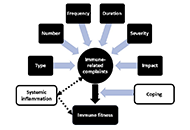-
 Special Issue Topic
Special Issue TopicImmune Fitness in Health, Disease, and Longevity
Submission Deadline: November 01, 2023Guest Editor
Joris C Verster E-Mail
Utrecht University, Utrecht Institute for Pharmaceutical Sciences (UIPS), Division of Pharmacology, Universiteitsweg 99, 3584CG, Utrecht, The Netherlands; Swinburne University of Technology, Centre for Human Psychopharmacology, Melbourne, VIC 3122, Australia
About the Special Issue
Immune fitness refers to the capacity of the body to respond to health challenges (such as infections) by activating an appropriate immune response, which is essential to maintain health, and prevent and resolve disease [1]. Adequate immune fitness plays an essential role from early life to healthy aging and is a crucial factor in longevity. Reduced immune fitness increases the chance of developing immune-related noncommunicable diseases (NCDs) such as cardiovascular disease, diabetes, depression, and asthma, and communicable diseases such as infections. For example, a recent study revealed that immune fitness before the 2019 coronavirus disease (COVID-19) pandemic was the best predictor of the presence and severity of COVID-19 symptoms once infected with SARS-CoV-2 [2]. In addition, experiencing common temporary immune-related complaints such as the common cold or influenza and the severity of related signs and symptoms also depends on the immune fitness of the individual. Research showed that reduced immune fitness has a significant impact on daily life. For example, reduced immune fitness has been associated with poorer mood and an important cause of absenteeism and presenteeism [3]. Research into factors affecting immune fitness such as health status and lifestyle factors (e.g., sleep, daily diet, physical activity, and substance use) is therefore vital. Immune fitness can be measured with single-item rating scales or questionnaires such as the Immune Status Questionnaire (ISQ) [1]. In addition, biomarkers of systemic inflammation (e.g., cytokines) can provide valuable information on functioning of the immune system. Immune fitness and its biobehavioral correlates is a rapidly growing multidisciplinary research field. For the current special issue we invite original articles, brief reports, commentaries, and review articles on immune fitness in health, disease, and longevity.
References
[1] Verster JC, Kraneveld AD, Garssen J. The assessment of immune fitness. Journal of Clinical Medicine 2023, 12, 22. https://doi.org/10.3390/jcm12010022
[2] 23. Kiani P, Balikji J, Kraneveld AD, Garssen J, Bruce G, Verster JC. Pandemic preparedness: the importance of adequate immune fitness. Journal of Clinical Medicine 2022, 11, 2442. https://doi.org/10.3390/jcm11092442
[3] Sips ASM, Severeijns NR, Kraneveld AD, Garssen J, Verster JC. Reduced immune fitness: Related absenteeism from work, presenteeism, and estimated costs for the Dutch economy. International Journal of Environmental Research and Public Health 2023, 20, 1761. https://doi.org/ijerph20031761
Keywords: immune fitness, health, disease, longevity, biomarkers, systemic inflammation
Call for Papers
Published Articles
 The concept and assessment of immune fitnessOpen AccessEditorialJoris C. Verster ... Johan GarssenPublished: October 27, 2023 Explor Immunol. 2023;3:500–505
The concept and assessment of immune fitnessOpen AccessEditorialJoris C. Verster ... Johan GarssenPublished: October 27, 2023 Explor Immunol. 2023;3:500–505
DOI: https://doi.org/10.37349/ei.2023.00116 -
-
Ongoing Special Issues
-
Completed Special Issues